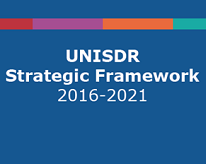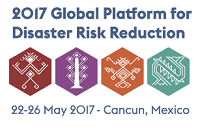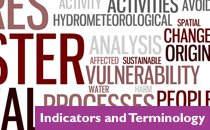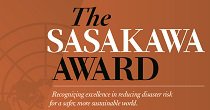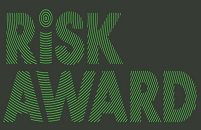- Our Mandate
- What is Disaster Risk Reduction?
- What is the International Strategy?
- UNISDR in the UN System
- SRSG for Disaster Risk Reduction
- Strategic Framework, Work Programme & Annual Reports
- External Evaluations
- Results Based Management System
- Donor Partnerships
- History
- Vacancies
Latest News
-
Connect with us
Sendai Framework for Disaster Risk Reduction
Sendai Framework: a tool to achieve the Sustainable Development Goals
Click here to watch "Sendai Framework: 1 Minute With"
The Sendai Framework, the first of the world's post-2015 development agreements, was adopted in March 2015. It was followed by three other major intergovernmental accords: the July 2015 Addis Ababa Action Agenda on financing for development; Transforming our World: the 2030 Agenda for Sustainable Development, adopted in September 2015; and the December 2015 Paris Agreement on climate change.
More on Sustainable Development and Climate Change
UNISDR Strategic Framework 2016-2021
UNISDR's Strategic Framework 2016-2021 is guided by the following vision, mandate and overarching objective: the substantial reduction of disaster risk and losses for a sustainable future; focal point of the United Nations system for disaster risk reduction and the custodian of the Sendai Framework, supporting countries and societies in its implementation, monitoring and review of progress; the prevention of new and reduction of existing disaster risk and strengthening resilience through successful multi-hazard disaster risk management.
Click here to download our Strategic FrameworkUNISDR Annual Report 2016
This is the first Annual Report against the UNISDR Work Programme 2016-2019 and in support of the implementation of the Sendai Framework for Disaster Risk Reduction 2015-2030.
Click here to download our Annual ReportThe biennial Global Platform, launched in 2007, is the world's foremost gathering on reducing disaster risk and building the resilience of communities and nations. The 2017 edition, which was the first of the Sendai Framework era, took place from 22 to 26 May in Cancun, Mexico. Click here to find out more.
Indicators and Terminology
Intergovernmental Expert Working Group
The third and final formal session of the Open-Ended Intergovernmental Expert Working Group on Indicators and Terminology Relating to Disaster Risk Reduction took place in Geneva from 14-18 November, issuing a final report for approval by the UN General Assembly. Click here to find out more.
Technical Briefings & Background PapersTHE 2017 SASAKAWA AWARD
The UN Sasakawa Award for Disaster Risk Reduction honours an individual, organization or initiative which has made a substantial contribution to saving lives and reducing global disaster mortality. The latest award was presented at the 2017 Global Platform for Disaster Risk Reduction, and recognised work in Portugal, Iran, Brazil and Fiji. Click here for more
Find out more about past editions of the Sasakawa AwardTHE 2017 RISK AWARD
The RISK Award, endowed with €100,000, is issued every two years by UNISDR, the Global Risk Forum Davos and the Munich Re Foundation. This year's award, issued at the 2017 Global Platform for Disaster Risk Reduction, went to the Nursing Association of Nepal won the prize for its “EpiNurse” project – short for “Epidemiology Nurse” – which will equip nurses with monitoring and surveillance tools to prevent and control infectious diseases after disasters. Click here for more about the RISK Award
WE ARE ONE: AFRICA'S DISASTER RISK REDUCTION ANTHEM

"We Are One", with lead vocals by Zambian recording artist Lucy Nkhoma, was produced by Health Songs International for UNISDR. You can download the ringtone version above, or listen to the full song here on our YouTube channel.
WORLD TSUNAMI AWARENESS DAY
The first ever World Tsunami Awareness Day took place in November 2016. Tsunamis are rare. But they can be extremely deadly. Such a stark impact isn't inevitable, however. Early warning systems can save lives. Equally important is community and individual understanding about how and where to evacuate before a wave strikes. Tsunamis know no borders, making international cooperation key for deeper political and public awareness of risk reduction measures.
Find out more about #TsunamiDay2016INTERNATIONAL DAY FOR DISASTER REDUCTION 2016: REDUCING MORTALITY
The 2016 edition of International Day for Disaster Reduction marked the start of the "Sendai Seven Campaign – 7 Targets, 7 Years”. It's an advocacy initiative to encourage implementation of the Sendai Framework for Disaster Risk Reduction, with the goal of saving lives, reducing disaster losses and improving management of disaster risk.
Highlights of #IDDR2016Uniting Nations, People and Action for Resilience
The vast majority of disasters are linked to high-impact weather and hydrological events as well as climate extremes, including rapid-onset hazards such as tropical cyclones and slow-onset hazards such as droughts. Disaster risk reduction is, therefore, at the core of the mission of WMO and the National Meteorological and Hydrological Services (NMHSs) of its 191 Member States and Territories. More about WMO
United Nations Plan of Action on Disaster Risk Reduction for Resilience
Collective action by the UN system is critical to ensure that disaster risk is reduced, a fact underlined in the Sendai Framework and its linked post-2015 agreements, including the 2030 Agenda for Sustainable Development. The revised UN Plan of Action, approved in April 2016, represents an opportunity for the United Nations system to actively work towards the Sustainable Development Goals as one body.
Click here for more on the UN Plan of Action









